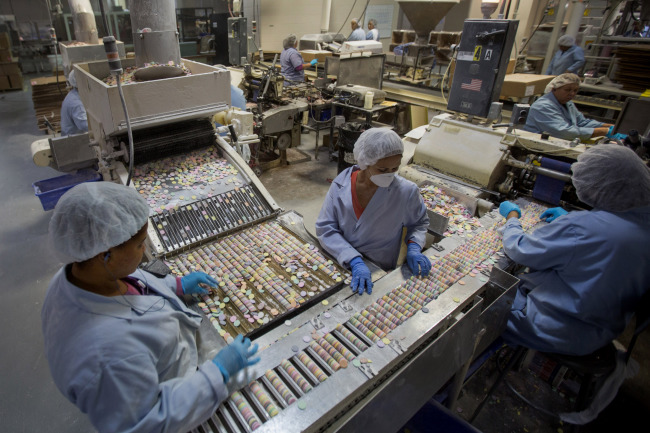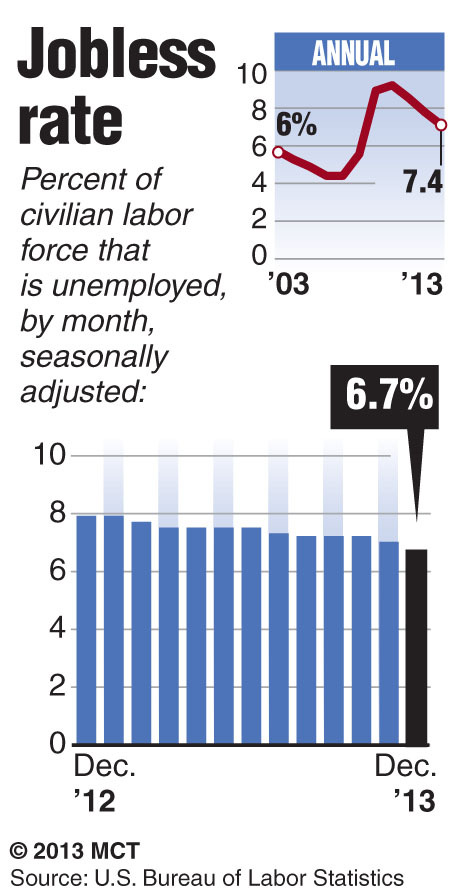 |
Workers sort “Necco Wafers” at the New England Confectionery Co. in Revere, Massachusetts. (Bloomberg) |
The Federal Reserve will stick to its plan for a gradual reduction in bond purchases, economists said after a government report showed that U.S. employment rose at the slowest pace in three years in December.
The Fed will reduce purchases by $10 billion at each of the next six meetings this year before ending the program in October, according to the median forecasts of 42 economists in a Bloomberg survey.
The 74,000 gain in payrolls was the weakest since January 2011, Labor Department figures showed Friday in Washington. The coldest December in four years probably contributed to a slump in hiring at construction and recreation companies, while industries such as health care and accounting also cut staff.
“The weather probably did play a big role,” said Michael Feroli, chief U.S. economist at JPMorgan Chase & Co. in New York. “It’s a reminder that the improvement is not going to be a straight line.”
The 10-year Treasury yield fell to 2.86 percent Friday from 2.97 percent late the previous day. The Standard & Poor’s 500 Index rose 0.2 percent to 1,842.37 at the close in New York.

The median forecast of the economists surveyed by Bloomberg projected payrolls would increase by 197,000. Estimates ranged from gains of 100,000 to 250,000.
The unemployment rate declined to 6.7 percent, the lowest since October 2008, as more people left the labor force. The rate was forecast to hold at 7 percent. The participation rate, which measures the proportion of people who are employed or looking for work, decreased to 62.8 percent, matching October as the lowest since 1978.
“The medium- to long-term concern is labor-force participation,” said Vincent Reinhart, chief U.S. economist at Morgan Stanley in New York. “Our population growth has slowed, fewer people want to work and productivity growth seems to have slowed.”
The decline in the jobless rate poses a communications challenge for the Fed, which had pledged to hold the main interest rate near zero as long as unemployment stays above 6.5 percent. Last month, they added that borrowing costs will stay low “well past” that level.
“Their decision to step away some from strong rate guidance through an unemployment rate threshold in December seems prescient,” said Reinhart.
The Fed probably won’t alter the unemployment threshold, according to the Bloomberg survey of economists. Seventy-three percent of 41 economists said the 6.5 percent threshold will remain. Twenty-two percent said the Fed will alter it, and 5 percent said it will be dropped entirely. (Bloomberg)
Policy makers in December decided to cut monthly bond purchases to $75 billion starting in January from $85 billion, citing improvement in the labor market.
Among those having trouble finding work is Caroline Hogge, 48, who has been looking since July 2012, when she left a procurement job at Warner Bros. in California. She moved back to her parents’ home in Tennessee and has applied for jobs as far away as New Hampshire and Indiana.
“I go in for the interview, and then have feedback saying that ‘oh, they loved you, but you were overqualified,’” said Hogge, who has a master’s degree in European studies from Indiana University.
The White House quickly connected the jobs report with the debate on Capitol Hill over extending unemployment insurance for 1.3 million long-term jobless Americans whose government benefits have expired.
“Despite an abundance of evidence indicating that this challenge is far from solved, Congress allowed extended unemployment insurance to lapse at the end of 2013, cutting off a critical lifeline to those who lost a job through no fault of their own and are still searching for work,” Jason Furman, chairman of the Council of Economic Advisers, said in a statement.
House Speaker John Boehner, an Ohio Republican, called Friday’s report “disappointing.” He and others pointed to the decline in the unemployment rate as a measure of how many people have dropped out of the labor force.
“The president’s policies are failing too many Americans, many of whom have simply stopped looking for work,” Boehner said in a statement.
The government’s survey of households, from which the jobless rate is calculated, showed the labor force dropped by 347,000 people.
Poor weather probably played a role in depressing payrolls, especially in industries such as construction. Figures based on the household survey showed 273,000 Americans weren’t at work because of weather during the survey week, which last month included Dec. 5, earlier than usual. That was the most for any December since 1977, the Labor Department said. (Bloomberg)









